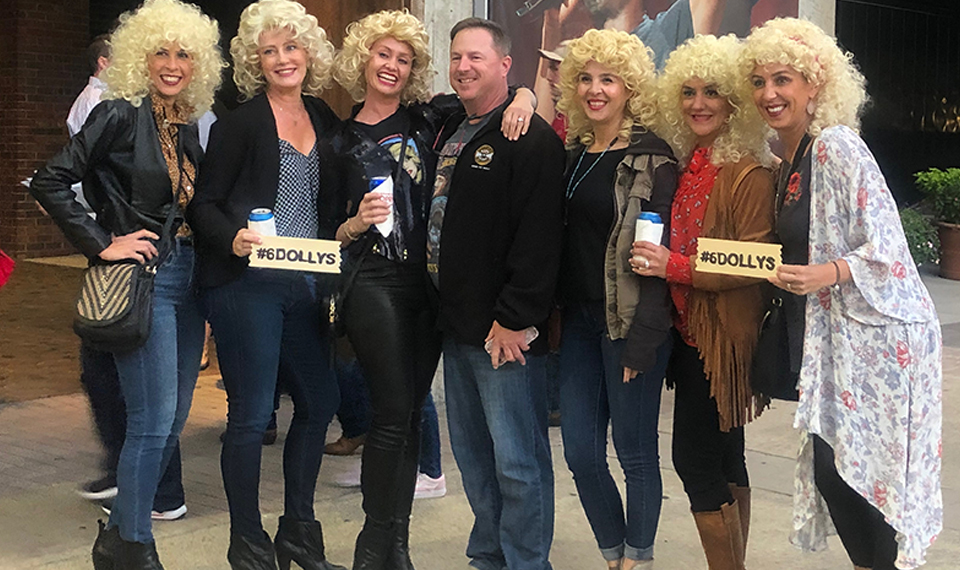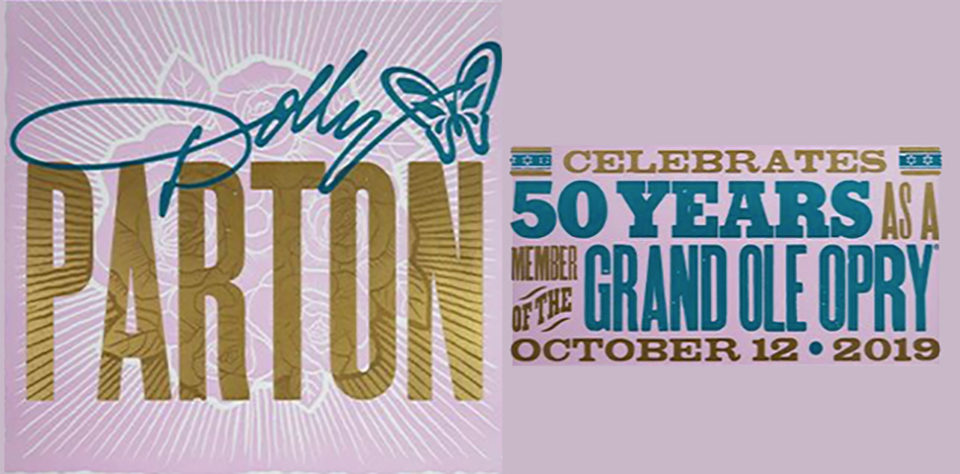As Ken Burns’ documentary demonstrated, few country music stars—few stars in any genre—have a more loyal fan base than Dolly Parton. Nashville wrapped up “Dolly Week” with two Opry shows celebrating Dolly’s 50thanniversary as a member of the Opry. Many fans turned out in Dolly t-shirts, jeans, and cowboy boots, but others sported hand-decorated jackets and rhinestone-studded bags, coats of many colors, sequined formal gowns, and cowgirl-style fringed dresses that Dolly herself might wear on stage. One group of friends arrived in matching blonde bouffant wigs holding “#Six Dollys” signs.

The show featured a number of other performers, singing their own songs as well as a song written or made famous by Parton. Bill Anderson, the Opry’s regular opening act, sang “But You Know That I Love You” and “Too Country.”
Jeannie Seeley sang “My Place Is the South” and her sassy rendition of “Who Needs You?” followed by budding recording artist Candi Carpenter of the Suffragettes, whose album The Astronaut, produced by Brandi Carlile, comes out October 13. After singing the title track from her CD, she delivered a rendition of “Little Sparrow” that drew a standing ovation for Carpenter.
East Nashville hit recording artist Margo Price sang “Wildflowers Don’t Care Where They Grow” from Parton’s Trio album, recorded with Emmylou Harris and Linda Ronstadt. She followed up with “The Seeker.”
When Toby Keith took the stage, he sang one of his own hits “God Love Her.” He told the crowd, “My bucket runneth over. I had to get a new bucket–got Dolly in it.” He said when he was asked to play on the show, he was sent a list of Parton’s songs to choose.
“I told them I can’t do chick songs,” he said, singing a few high-pitched lines from the chorus of “I Will Always Love You,” which brought laughs. Instead he sang “Kentucky Gambler,” a song Parton wrote for his hero Merle Haggard.
Lady Antebellum opened with “What If I Never Get Over You?” and their own “American Honey,” and then related how they started together as songwriters but found themselves in a downtown Nashville karaoke bar singing “Islands in the Stream.” They invited the audience to sing along as they delivered the iconic Dolly Parton-Kenny Rogers duet.
Hank Williams, Jr.’s set, performing his own “Country Boy Can Survive” and the standard “Move It on Over” was the one that left the audience scratching their heads a little.
The performances were punctuated by the Opry’s regular announcer, reminding the crowd they were part of the Grand Ole Opry’s regular radio show, as he narrated Parton’s career decade by decade, from her arrival in Nashville in 1964 through her years with Porter Wagoner through her Hollywood successes, her collaboration with Harris and Ronstadt, and her continued years in the spotlight.By the time Dolly took the stage, the crowd was ready to celebrate.
She started with “Joshua,” her first number one hit and talked about her own career that started when was “a little old bitty thing” telling stories, painting word pictures, and turning them into songs in their home without television or other outside entertainment.
After she sang “Jolene,” someone in the audience yelled, “I love you, Dolly!” and she shot back, “I told you to wait in the truck.” She sat to play her mountain dulcimer, explaining that instead of wearing a fancy dress, she had worn pants since she’d be sitting.Displaying her dulcimer as bejeweled as her outfit, she said, “I never leave a rhinestone unturned.”
As she sang “My Tennessee Mountain Home” and “Coat of Many Colors,” Parton reminisced about her own upbringing.
“I loved my parents,” she said, calling them “the greatest gift that God gives you.” She described growing up one of twelve children—six boys and six girls—and her mother sewing all their clothes, many out of feed sacks. “They made me rich in gratefulness,” she said.
Parton described the turning points in her career, particularly when she decided to launch out from Nashville, leading many to accuse her of leaving country.
“How could I do that?” she asked. “I told them I’m gonna take that with me and do some bigger things.” She then performed her first billion seller that followed, “Here You Come Again.”
During the evening, Dolly shared warm memories of Porter Wagoner, who gave her the first break of her career. The audience was shown a film clip of her singing “I Will Always Love You” to him shortly before his death. She said Wagoner’s daughters were her guests in the audience that night. She also invited Buck Trent, who played with Porter during those days and also invented the electric banjo, to join her on Wagoner’s big crossover hit “The Carroll County Accident.”
Parton wrapped up the evening with two of her best-loved songs, “Nine to Five,” which had the crowd singing along and finally “I Will Always Love You.”
As the seven o’clock crowd filed out, Dolly and her guests retired backstage for the nine o’clock show to another full house. Unlike so many Nashville tribute shows, most of Dolly Parton’s fans left anticipating her 60thanniversary show.

